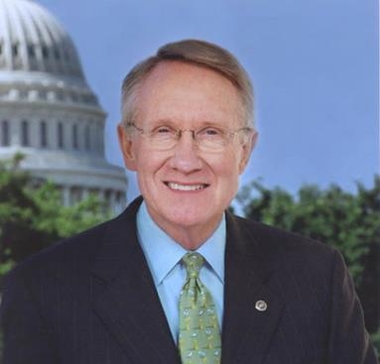Senate Dems to try for debt ceiling increase

ANDREW TAYLOR, Associated Press
WASHINGTON (AP) — Democrats controlling the Senate plan to move quickly toward a vote to allow the government to borrow more money, challenging Republicans to a filibuster showdown as the time remaining to stop a first-ever default on U.S. obligations ticks by.
A spokesman said Senate Majority Leader Harry Reid could unveil the measure as early as Tuesday, setting the table for a test vote later in the week. The measure is expected to provide enough borrowing room to last beyond next year's election, which means it likely will permit $1 trillion or more in new borrowing above the current $16.7 trillion debt ceiling that the administration says will be hit on Oct. 17. It's not expected to include new spending cuts sought by Republicans.
The development comes as a partial shutdown of the government enters its second week with no end in sight.
Those affected include families of service members killed in action. Survivors are typically sent a $100,000 payment within three days to help with costs such as funeral expenses. Because of the shutdown, the Defense Department doesn't have the authority to make the payments, officials said Monday, even though most of the department's civilian workers have been recalled.
Some 350,000 civilian Defense Department workers were summoned back to work Monday as the result of legislation Congress passed and Obama signed after the shutdown began. Many other agencies, such as NASA and the Environmental Protection Agency, remain mostly shuttered.
Even the White House is feeling the effects, with about 3 out of 4 staffers furloughed.
It's not clear whether Reid's gambit will work in the Senate. Republicans are expected to oppose the measure if it doesn't contain budget cuts to make a dent in deficits. The question is whether Republicans will try to hold up the measure with a filibuster. Such a showdown could unnerve the financial markets.
Until recently, debt limit increases have not been the target of filibusters; the first in memory came four years ago, when Democrats controlled the Senate with a filibuster-proof 60 votes.
Many Republicans in the Senate, including Minority Leader Mitch McConnell of Kentucky and Whip John Cornyn of Texas, have voted for so-called clean debt limit increases during Republican administrations.
Some Republicans seemed wary of participating in a filibuster that could rattle the stock and bond markets.
"We shouldn't be dismissing anything out of hand, whether it's the debt ceiling or what we're going to do with this government shutdown," Sen. Lisa Murkowski, R-Alaska, said. "We've got a situation where you've got a calendar running, you've got people who are frustrated and upset, so let's figure it out."
The impasse over the shutdown — sparked by House Republicans' insistence that a temporary funding bill contain concessions on President Barack Obama's health care law — shows no signs of breaking, as each side sticks to its guns and repeats its talking points.
Democrats from Obama on down to the most junior lawmakers said again that the House should vote immediately on ending the partial closure of the government. Obama said House Speaker John Boehner, R-Ohio, "doesn't apparently want to see the ... shutdown end at the moment, unless he's able to extract concessions that don't have anything to do with the budget."
Boehner, in rebuttal, called on Obama to agree to negotiations on changes in "Obamacare" and steps to curb deficits, the principal GOP demands for ending the shutdown that began with the Oct. 1 beginning of the new fiscal year, and eliminating the threat of default. "Really, Mr. President. It's time to have that conversation before our economy is put further at risk," Boehner said on the House floor.
The White House has said repeatedly the president will not negotiate with Republicans until the government is fully reopened and the debt limit has been raised. But it hasn't said the debt limit measure has to be completely "clean" of add-ons.
White House aide Jason Furman told reporters the White House could accept some add-ons if Boehner "needs to have some talking point for his caucus that's consistent with us not negotiating ... that's not adding a bunch of extraneous conditions." Another White House official, Gene Sperling, said the administration could be open to an interim, short-term debt limit extension to prevent a catastrophic default.
Republicans were sticking with a strategy of trying to pin the blame for the shutdown on Obama for being unwilling to negotiate. The House also passed legislation Monday to reopen the Food and Drug Administration, the latest in a series of piecemeal funding bills to advance through the GOP-controlled chamber.
It's been commonly assumed that Republicans would suffer politically from the shutdown and the early polling data seems to bear that out.
A survey released Monday by The Washington Post and ABC News said disapproval of Republican handling of the budget showdown was measured at 70 percent, up from 63 percent a week earlier. Disapproval of Obama's role was statistically unchanged at 51 percent.
Copyright 2013 The Associated Press. All rights reserved. This material may not be published, broadcast, rewritten or redistributed.
October 8, 2013





